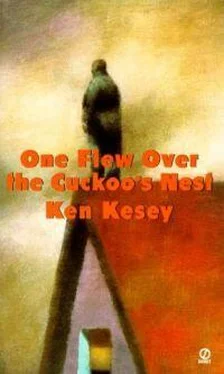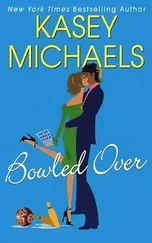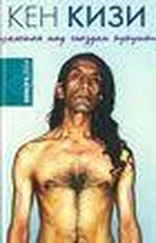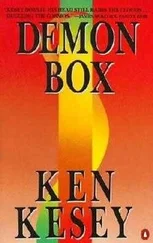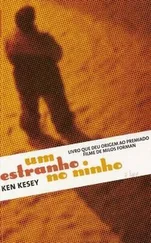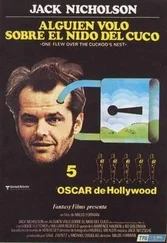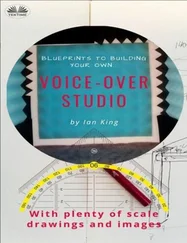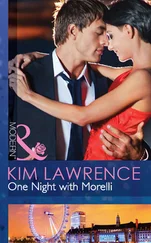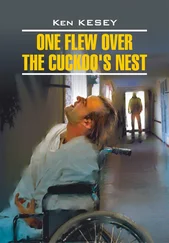The lifeguard raised his shoulders in a musclebound shrug and tugged at the whistle around his neck. He was an old pro-footballer with cleat marks in his forehead, and every so often when he was off his ward a signal would click back of his eyes and his lips’d go to spitting numbers and he’d drop to all fours in a line stance and cut loose on some strolling nurse, drive a shoulder in her kidneys just in time to let the halfback shoot past through the hole behind him. That’s why he was up on Disturbed; whenever he wasn’t lifeguarding he was liable to do something like that.
He shrugged again at McMurphy’s question, then looked back and forth to see if any black boys were around, and knelt close to the edge of the pool. He held his arm out for McMurphy to look at.
“You see this cast?”
McMurphy looked at the big arm. “You don’t have a cast on that arm, buddy.”
The lifeguard just grinned. “Well, that cast’s on there because I got a bad fracture in the last game with the Browns. I can’t get back in togs till the fracture knits and I get the cast off. The nurse on my ward tells me she’s curing the arm in secret. Yeah, man, she says if I go easy on that arm, don’t exert it or nothing, she’ll take the cast off and I can get back with the ball club.”
He put his knuckles on the wet tile, went into a three-point stance to test how the arm was coming along. McMurphy watched him a minute, then asked bow long he’d been waiting for them to tell him his arm was healed so he could leave the hospital. The lifeguard raised up slowly and rubbed his arm. He acted hurt that McMurphy had asked that, like he thought he was being accused of being soft and licking his wounds. “I’m committed,” he said. “I’d of left here before now if it was up to me. Maybe I couldn’t play first string, with this bum arm, but I could of folded towels, couldn’t I? I could of done something . That nurse on my ward, she keeps telling the doctor I ain’t ready. Not even to fold towels in the crummy old locker room, I ain’t ready.”
He turned and walked over to his lifeguard chair, climbed up the chair ladder like a drugged gorilla, and peered down at us, his lower lip pushed way out. “I was picked up for drunk and disorderly, and I been here eight years and eight months,” he said.
McMurphy pushed backward from the edge of the pool and trod water and thought this over: he’d had a six months’ sentence at the work farm with two months finished, four more to go — and four more months was the most he wanted to spend locked up any place. He’d been close to a month in this nuthouse and it might be a lot better than a work farm, what with good beds and orange juice for breakfast, but it wasn’t better to the point that he’d want to spend a couple of years here.
He swam over to the steps at the shallow end of the pool and sat there the rest of the period, tugging that little tuft of wool at his throat and frowning. Watching him sitting there frowning all to himself, I remembered what the Big Nurse had said in the meeting, and I began to feel afraid.
When they blew the whistle for us to leave the pool and we all were straggling toward the locker room, we ran into this other ward coming into the swimming pool for their period, and in the footbath at the shower you had to go through was this one kid from the other ward. He had a big spongy pink head and bulgy hips and legs — like somebody’d grabbed a balloon full of water and squeezed it in the middle — and he was lying on his side in the footbath, making noises like a sleepy seal. Cheswick and Harding helped him stand up, and he lay right back down in the footbath. The head bobbed around in the disinfectant. McMurphy watched them lift him standing again.
“What the devil is he?” he asked.
“He has hydrocephalus,” Harding told him. “Some manner of lymph disorder, I believe. Head fills up with liquid. Give us a hand helping him stand up.”
They turned the kid loose, and he lay back down in the footbath again; the look on his face was patient and helpless and stubborn; his mouth sputtered and blew bubbles in the milky-looking water. Harding repeated his request to McMurphy to give them a hand, and he and Cheswick bent down to the kid again. McMurphy pushed past them and stepped across the kid into the shower.
“Let him lay,” he said, washing himself down in the shower. “Maybe he don’t like deep water.”
I could see it coming. The next day he surprised everybody on the ward by getting up early and polishing that latrine till it sparkled, and then went to work on the hall floors when the black boys asked him to. Surprised everybody but the Big Nurse; she acted like it was nothing surprising at all.
And that afternoon in the meeting when Cheswick said that everybody’d agreed that there should be some kind of showdown on the cigarette situation, saying, “I ain’t no little kid to have cigarettes kept from me like cookies! We want something done about it, ain’t that right, Mack?” and waited for McMurphy to back him up, all he got was silence.
He looked over at McMurphy’s corner. Everybody did. McMurphy was there, studying the deck of cards that slid in and out of sight in his hands. He didn’t even look up. It was awfully quiet; there was just that slap of greasy cards and Cheswick’s heavy breathing.
“I want something done!” Cheswick suddenly yelled again. “I ain’t no little kid!” He stamped his foot and looked around him like he was lost and might break out crying any minute. He clenched both fists and held them at his chubby round chest. His fists made little pink balls against the green, and they were clenched so hard he was shaking.
He never had looked big; he was short and too fat and had a bald spot in the back of his head that showed like a pink dollar, but standing there by himself in the center of the day room like that he looked tiny. He looked at McMurphy and got no look back, and went down the line of Acutes looking for help. Each time a man looked away and refused to back him up, and the panic on his face doubled. His looking finally came to a stop at the Big Nurse. He stamped his foot again.
“I want something done! Hear me? I want something done! Something! Something! Some—”
The two big black boys clamped his arms from behind, and the least one threw a strap around him. He sagged like he’d been punctured, and the two big ones dragged him up to Disturbed; you could hear the soggy bounce of him going up the steps. When they came back and sat down, the Big Nurse turned to the line of Acutes across the room and looked at them. Nothing had been said since Cheswick left.
“Is there any more discussion,” she said, “on the rationing of cigarettes?”
Looking down the canceled row of faces hanging against the wall across the room from me, my eyes finally came to McMurphy in his chair in the corner, concentrating on improving his one-handed card cut… and the white tubes in the ceiling begin to pump their refrigerated light again… I can feel it, beams all the way into my stomach.
After McMurphy doesn’t stand up for us any longer, some of the Acutes talk and say he’s still outsmarting the Big Nurse, say that he got word she was about to send him to Disturbed and decided to toe the line a while, not give her any reason. Others figure he’s letting her relax, then he’s going to spring something new on her, something wilder and more ornery than ever. You can hear them talking in groups, wondering.
But me, I know why. I heard him talk to the lifeguard. He’s finally getting cagey, is all. The way Papa finally did when he came to realize that he couldn’t beat that group from town who wanted the government to put in the dam because of the money and the work it would bring, and because it would get rid of the village: Let that tribe of fish Injuns take their stink and their two hundred thousand dollars the government is paying them and go some place else with it! Papa had done the smart thing signing the papers; there wasn’t anything to gain by bucking it. The government would of got it anyhow, sooner or later; this way the tribe would get paid good. It was the smart thing. McMurphy was doing the smart thing. I could see that. He was giving in because it was the smartest thing to do, not because of any of these other reasons the Acutes were making up. He didn’t say so, but I knew and I told myself it was the smart thing to do. I told myself that over and over: It’s safe. Like hiding. It’s the smart thing to do, nobody could say any different. I know what he’s doing.
Читать дальше
